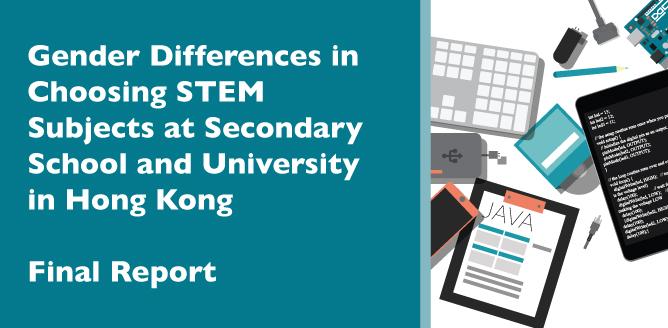Gender Differences in Hong Kong's STEM Education
Commissioned by The Women’s Foundation and supported through MTR Corporation, Dr. Anita Chan and Dr. Adam Cheung from Education University of Hong Kong, conducted a study to better understand whether and why young boys and girls in Hong Kong choose STEM subjects as electives in the Diploma of Secondary Education (DSE) exams, university majors, and future careers. Over 2,800 F.5 male and female students from 43 schools in Hong Kong participated in the study which included self-administered questionnaires and intensive focus group interviews.
Key findings
- Female students not only start with a lower proportion of STEM-related electives in the DSE curriculum, but they are more likely to drop STEM-related courses than male students later on.
- Female students tend to have lower self-efficacy and interest in STEM subjects, and rank these subjects as less important for their future studies and careers than male students do.
- Even high-achieving female students in STEM are subject to gender biases that suggest only boys have the inborn talent to study STEM, especially Math, efficiently and effortlessly; whereas female students can only attain good results through rote learning and practice. This stereotypical belief undermines girls’ confidence and discourages them from pursuing STEM as a university major or as a future career.
- Students’ subject choice in DSE is shaped by school culture which often prioritises the sciences over the arts, encouraging high achievers to see the sciences as a strategic choice that enhances their chance of university entrance.
- Female students have a higher preference than male students to work in jobs that can help other people and that they think are meaningful, and have a lower preference than male students to take a job with STEM-related characteristics. Our analysis further suggests that the gender differences in the preference on job characteristics substantially explain the gender difference in the intention to pursue STEM as future studies or a career.


















